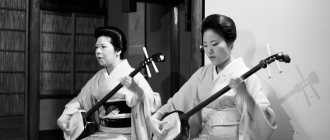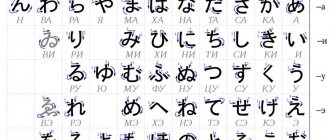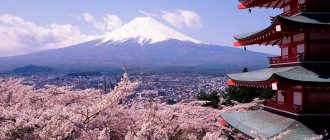The Japanese are an incredible and open-to-the-world people, whose character contains many distinctive features - hard work, discipline, practicality, accuracy. All this is intertwined with aesthetic features that are inherent in almost all Japanese, regardless of their location. After all, in addition to the 127 million local population , about 3 million more Japanese live in the largest countries of the world . The largest number of representatives of the Asian country live in the United States (1.2 million people), as well as in Brazil (about 1.5 million people). About 120 thousand Japanese live in Asia, approximately 90 thousand live in Canada. About 15 thousand people live in European countries. A small number of Japanese (5 thousand people) can be seen in Australia, as well as in other countries of the planet.
Japanese people
Cultural characteristics of the Japanese people
Japanese culture is extremely rich and diverse. The Japanese express a heightened feeling in almost all areas of life, including cultural traditions. Despite the fact that each region has some differences in this area, family traditions are sacredly respected here, and they attach great importance to national holidays and various rituals. One of the main distinguishing features of the Japanese is their elevated attitude towards the world around them. Only the subtle spiritual organization of the inhabitants can so poetically glorify the forces of nature in their creativity. The Japanese have no less scrupulous attitude towards flowers, which is expressed by the development of various styles of flower arrangements - ikebana, rikka, nageire, seike. The tea ceremony, founded by Sen no Rikyu, occupies a special place among the Japanese. To learn this difficult custom requires quite a long time and endurance, which the Japanese do not have to spare. An important feature of the ceremony is not only the process of drinking tea, but also the aesthetic pleasure that guests receive during the entire process. The ancient ritual takes place in specially designated rooms and represents one of the most important and meaningful national traditions.
Japanese spirituality
The Japanese people's calm attitude towards religiosity is due to the formation of several spiritual directions over the years. But still, Buddhism and Sentoism have the main influence on the way of life of the population. A large number of temples, both ancient and modern, impress with their majesty and originality. Despite the technological progress that has engulfed one of the oldest countries on the planet, people here take the observance of local rituals quite seriously. In addition to visiting Buddhist and Sento shrines, a third of the population periodically makes pilgrimages, which has a positive effect on the level of spirituality of the Japanese.
Everything you need to know about the structure of Japanese society
Hierarchy, Duty, Devotion, Obedience: just as the four large islands form the basis of the Japanese archipelago, Japanese society is built on these four concepts at all levels - family, social, corporate. And this is precisely what is most difficult for Europeans, brought up on the slogans of freedom, equality, fraternity and tolerance, to comprehend.
Know your place
Hierarchy is the first and main principle that permeates Japanese society from top to bottom. Any group of Japanese is hierarchical by nature. This means that every member of a family, school class or team of employees knows their place. This means that the Japanese does not fight, does not seek a compromise, he simply silently accepts what is happening. In Japan, if you don't know your place, you literally won't know where to stand, where to sit, or how to communicate with other people. This is why Japanese businessmen who exchange business cards during an acquaintance study them so carefully. And not only in order to find out the name of a colleague, but also to understand what company the interlocutor works for - more important or less important? What position does he hold there - higher or lower? Where does he live - in a big city or in the suburbs? It's not a question of curiosity. In this way, the Japanese learns how to behave with a new acquaintance. Those who have reached a high level of the career ladder are treated with special respect, following a certain ritual. The Japanese language has several degrees of politeness, each of which applies depending on whether you are speaking to an inferior or an inferior, a senior or a junior, a man or a woman. Even simple verbs such as “see”, “give”, “say”, “do” are somewhat different if we are talking about a person occupying a higher level. You will always understand whether a person is talking to his equal or not. And sometimes it is not necessary to speak: the Japanese bow when they meet, and the lower the bow, the deeper the respect.
Be in a group
You are in the group or you are outside it, there is no third option. "Gaijin" - foreigner - is translated from Japanese as "a person from the outside." The echoes of the period of isolation that lasted more than two and a half centuries are still strong here - foreigners are treated with wary curiosity. The Japanese nation is very homogeneous: there are practically no national minorities, regional linguistic differences between different areas of the country are minimal, as well as differences in lifestyle. Therefore, foreigners, who number less than 2% in Japan, often face discrimination: they have difficulty finding work and may be denied housing. Moreover, a foreigner remains such, even if he was born in Japan and does not know any other language other than Japanese.
The Japanese value belonging to a group and in every possible way emphasize their connection with it. It is very important to meet the expectations of others and dress as required by the circumstances. A Japanese child “grows up” in a school uniform, which is mandatory for both public and private schools. Many companies have their own “uniform” - a jacket and tie of a certain color. When you look at a group of people, you immediately realize that they are serving together. And a Japanese person will certainly buy a ski suit, even if he is going to ski down a gentle hill, because this is exactly the kind of clothing he should wear when skiing. Groupthink is so strong in Japan that it can be difficult to find out from an individual what he likes, and even more difficult - what he doesn’t like. Even if he answers, he will begin with the words: “We, the Japanese...” It’s not for nothing that they like to repeat here that a protruding nail gets hit on the head. Well, if someone behaves differently than usual, the Japanese will say: “It looks like it’s going to rain.” And this will mean that at the sight of such outrage, even the sky is about to cry.
Think about others
The Japanese never breaks ties with his group, be it family or colleagues, and this is expressed in the sweet tradition of omiyage. Going on a long business trip? Bring omiyage. Traveled to a neighboring city for a business or personal meeting? Buy omiyage. Are you on vacation with your family outside the city? Don't forget about omiyage. The word “omiyage” is often translated as “souvenir”, “gift”, but its meaning is much deeper. Omiyage is a small beautifully packaged box, but more often a bag of brightly colored scraps of fabric with something characteristic of the place where they are purchased, usually edible: sweets, candies, dried fruits, nuts, sometimes pies or pastries. These goods abound in tourist shops, train stations and airports. This gift is bought for colleagues and relatives. And this is not just a tribute to politeness, but a way to say: “Even when I was far away, I was thinking about you.” Omiyage comes with special etiquette for selection and presentation. You give - the recipient refuses. You insist - he accepts.
Honor family
The hierarchy of Japanese society begins in the family. Family occupies the most important place in the life of a Japanese, and family ties are stronger than all others. Moreover, they connect not only living relatives, but also long-gone relatives. This connection is maintained through the Koseki family registry. Koseki is something like a family chronicle, where birth, death, marriage, divorce, adoption are recorded. Koseki once again emphasizes the lack of such a thing as individuality in Japan. Every Japanese is a member of a certain family. If you are a foreigner, you do not have the right to own a koseki, so such a registry is indisputable proof of Japanese citizenship. What does koseki look like? A piece of paper, albeit a very important one. In the recent past, koseki were filled out by hand, but now they are done on a computer and printed if necessary. After marriage, a Japanese man starts a new koseki, in which he will be recorded as the head of the family. A woman fits into the koseki first of her father, then of her husband. The only exception is if she marries a foreigner, in which case she is allowed to make her own registry.
Observe the sequence
The Japanese family is deeply patriarchal. That is why family property, family business, rights and responsibilities pass from father to son, in the vast majority of cases to the eldest. The rest of the children, having matured, must leave the family and look for their place in the sun. This tradition in the 19th century helped Japan develop cities and industry without destroying rural communities: “extra” sons went to the cities and got jobs in factories. It’s even simpler with daughters: they were married off and became part of their husband’s family.
Related to this is an interesting tradition of elderly Japanese adopting able-bodied adults. If only girls are born in a family, then there is no one to continue the dynasty, no one to take over the family business. In this case, the family includes the husband of one of the daughters. Along with his surname, he receives everything as if he were the eldest son.
Remember family and roles
In other respects, the modern Japanese family is very similar to the European family: it consists of a father, mother and minor children. Old people rarely live with adult children, unless they are widowed. But in any case, close relatives must live close enough to be able to bring a “bowl of hot soup.” Often in a Japanese family, only the father works - for hire or in the family business, spending so much time at work that he sees the family only on weekends. Japanese society expects a man to devote himself entirely to work and not be limited to a nine-to-five schedule. Many large corporations hire college graduates and only let them retire. A Japanese woman works until she gets married. After this, for 15–20 years, she will have full responsibility for running the household and raising children. The woman also manages family finances.
Love and teach children
The attitude of the Japanese towards children is known all over the world: there are no prohibitions or restrictions for children. The biggest disappointment for parents is the crying of a child, so almost everything is allowed to the little ones. But children live “in paradise” exactly until they go to school - then it’s time to learn what discipline, obligations, and lessons are. And also additional clubs: judo, baseball, violin or calligraphy. But there is no other way. You either achieve success step by step, or you lose at the start. A good school opens the way to a reputable university, and a university opens the way to a prestigious job. Primary and secondary schools are considered compulsory in Japan. But most also study in high school, after which they take extremely difficult exams to enter college. And there you can relax: successful admission to college (or university) guarantees its successful completion. But literacy in Japan reaches almost 100%.
Photo: press service archives
Features of national character
In addition to their adherence to national customs and love of nature, the Japanese can safely be called workaholics. This wonderful people is distinguished by a special responsibility and sense of duty, characterizing each resident as an example of a disciplined and efficient worker. In everyday life, the Japanese are characterized by such traits as politeness, goodwill, and respect for the older generation. The upbringing of children has an important influence on family relationships, which consists of teaching them to observe subordination in relation to the older generation. In this way, a sense of community and valued interests develops. First of all, this concerns a certain group, which is a prerequisite for the development of such qualities as a sense of duty and devotion to authority. In the daily life of the Japanese, friendliness and friendliness are self-evident concepts. Starting from a salesperson in a store, who will show maximum courtesy in service, to an expensive restaurant, where any client will be served with a smile, not because of high tips, but because politeness is an everyday norm among the Japanese. An equally important trait of the average Japanese is curiosity, characterized by a certain direction. This is partly due to the influence of Buddhist culture on the thinking of the population, which is distinguished by certain specifics.
"Society" and "community"
The terms shakai (society) and kojin (individual) that came into everyday use appeared in the Meiji era (1868-1912) in the process of translating foreign literature into Japanese.
The key concept of social life in Japan was seken - the general public, the masses. Seken consisted of small and large mura (communities). Each person belonged to a specific community. All members of the community were required to be the same; manifestations of individuality were not welcomed. The community revered the customs and experience of previous generations, and order was ensured through strict adherence to unwritten rules that seemed to be in the air.
The concept of shakai (society), which came to Japan from outside, denotes a collection of people, each of whom is an individual with unique feelings and thoughts. Society recognizes the individuality of each member and gives him rights and responsibilities.
From this point of view, Japanese society can hardly be called modern. After the Meiji Restoration, the concept and system of the modern state appeared in Japan, but within this shell there was still mura, and actual power lay not with the legitimate rulers, but with public opinion. Nowadays, there are often televised press conferences offering apologies for one reason or another, at which the expression “we didn’t do anything illegal, but we apologize for disturbing the peace” invariably appears. Truly, Japan is not a state governed by the rule of law, but a country ruled by seken.








